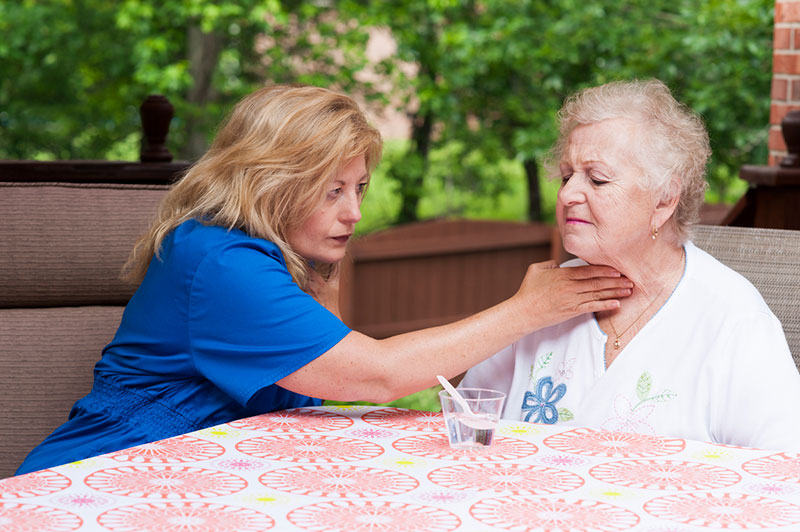
Dysphagia in the Elderly
Dysphagia is the medical name for difficulty swallowing. A painful condition, it can occur at any age but is more common among older individuals. Occasional trouble swallowing isn’t abnormal and can happen if someone eats too quickly or doesn’t chew their food thoroughly. However, if the issue persists or swallowing food becomes impossible, you should seek immediate medical attention.
If your elderly loved one has recently been struggling with swallowing food or drink, it’s important to know when to seek in-home care support.
What Causes Dysphagia in the Elderly?
There are numerous causes of dysphagia in the elderly. Ailments such as neurological damage, cancer, radiation therapy, and esophageal spasms or tumors can lead to dysphagia. Also, those with neurological disorders such as Alzheimer’s, muscular dystrophy, multiple sclerosis, or Parkinson’s disease are at a higher risk of developing dysphagia.
Warning Signs of Dysphagia
If you notice signs of dysphagia in your loved one, you should seek help from their physician immediately. Dysphagia does not resolve on its own and, left untreated, can get much worse over time. Symptoms of dysphagia may include the following:
- Discomfort or pain when swallowing
- Difficulty swallowing food or liquids
- Feeling of food getting stuck in the throat
- Excessive drooling
- Voice changes or hoarseness
- Food coming back up
- Frequent heartburn or acid reflux
- Stomach acid or food backing up into the throat
- Unexplained weight loss
- Coughing or gagging while swallowing
Caring for Someone with Dysphagia
Caring for someone with dysphagia requires special attention to their overall comfort while eating. Below are three key things to pay attention to when caring for individuals with dysphagia:
- Eating habits: Monitor your loved one’s eating habits to ensure they’re not experiencing discomfort or difficulty. Encourage small, frequent meals and avoid distractions during mealtime to help them focus on swallowing safely.
- Positioning during meals: Ensure your loved one is sitting upright during meals, as this can reduce the risk of food entering the airway. Maintaining an upright position after meals can also help digestion and prevent regurgitation.
- Swallowing techniques: Taking small bites, chewing food thoroughly, and swallowing slowly can help improve symptoms of dysphagia. Consider working with a speech therapist to develop a tailored care plan to meet your loved one’s needs.
Let CareBuilders at Home Help
At some point, caregiving for someone with dysphagia might require additional support. If managing meals for your elderly loved one becomes too overwhelming, it’s probably time to consider hiring an in-home care agency. Trained, compassionate caregivers can help with meal preparation, ensure proper feeding techniques, and offer companionship during mealtimes.
CareBuilders at Home, offers hourly, overnight, and even live-in care* services. We work with you to create a care plan that meets your loved one’s specific needs. With our home care services, you can have peace of mind knowing that your family member is being properly cared for.
To learn more about the services we offer and how we can help those struggling with dysphagia, contact us today.
*Not available in CA







